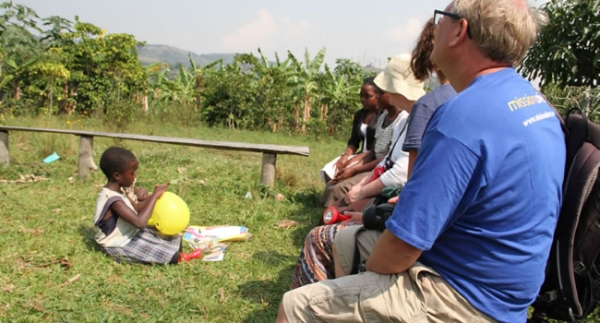Anita isn’t able to attend school because she is paralysed and has trouble with her bladder and bowel control. In stark contrast to countries like the UK, there is no provision for children such as Anita in much of Uganda. Rather than help being made available to her because of her needs, she is left at home and cannot receive any form of education.
Anita’s family do their very best to look after her; her father works away from home in the capital, Kampala because that is where he has managed to find work. Her mother works in the fields all day. Her two younger brothers, Aron and Freddie go to school. Her older sister died a few years ago having suffered from hydrocephalus.
"The project isn’t able to fund large operations or long term rehabilitation of patients such as Anita."
Anita is left to herself all day and because she cannot walk, she ‘crawls’ around the family home and spends much of her day in her own company, alone with her thoughts. When we met Anita she looked sad. We wondered what it must be like to be in her situation, to sit and think about what her future holds and to remember her short time in school. Anita is a very bright young lady and she would love to go to school again.
When I went to Uganda I took some money with me. I didn’t know what I would do with it but most likely I thought I would end up dividing it between the projects that we visited while we were out there. It wasn’t a huge amount of money.
When we met Anita I struggled to comprehend how hard it must be to live in those circumstances. Any support or help or medical treatment that would be of benefit to the family is quite simply beyond their reach. They will never be able to afford it, unimaginable for British SEN pupils.
The family work with the Chilli Children Project and grow chillis on their land. By being part of the program they have access to the treatment that the project is able to provide, but the project isn’t able to fund large operations or long term rehabilitation of patients such as Anita. Evas, who runs the Chilli Children Project was there with us when we met Anita and I asked what would it take to help Anita? What options are there? Is there anything at all that we could do?
The answer broke my heart. It would be possible to get Anita assessed to see if she is suitable for surgery or rehabilitation to help her incontinence. It would also be possible to get Anita assessed to see if she is suitable for surgery and then rehabilitation to maybe help her walk again. We could look at her attending a vocational school for girls where she will learn a valuable trade so that she feels she is ultimately contributing to the family home. We could provide equipment if it were suitable - a wheelchair, crutches.

Surely all this treatment and support would be completely out of reach for us. I had brought some money, a few hundred pounds, but not the kind of money Evas must have been talking about.
I was wrong. When we left the family, Evas wrote down an estimate of all the medical treatments that might be suitable for Anita. She costed it all out and for the small amount of money that I had, we could pay for Anita and Mary, Anita’s Mum, to travel one-and-a-half days away for an initial assessment. It would also cover all the treatment and/or surgery that Anita might be suitable for to completely transform her life. It may even go so far as to start to contribute towards helping fulfil Anita’s dream of getting back into education.
Can you imagine? A small amount of money going that far? I phoned home and spoke to my wife Nicole, and we agreed that it was the right thing to try to make a difference to this young girl. While SEN pupils back home in the UK have much more support as standard, it still felt important to share this story with the special education needs community.
To date, Anita has been assessed and is undergoing treatment to help her control her bladder and bowel. She has also, wonderfully, started school at the special school that is part of Cure Uganda and so is progressing in mainstream education, something we never expected her to be able to do. Anita is shortly being assessed for orthopedic surgery to hopefully, in time, help her to become more mobile.
There is a lot more that we have been able to help Anita and her family with and we hope to keep you up to date periodically, but we wanted to share this story of hope that had the most profound effect on me while I was in Rukungiri. It is something that has planted a seed which means I will most certainly be returning, but next year it is Nicole’s turn.
Have you undertaken a similar adventure? Share your experiences below!


















